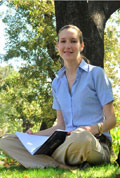Grief provides motivation for master’s student
March - April, 2009 | Volume 8, Issue 2
Port-au-Prince, Haiti — Despite growing up in a wealthy Haitian family of European descent with access to the best available health care, Verena de Matteis has suffered the pain of losing family members to malaria and AIDS, the scourges that continue to devastate her country.

Haitian master’s in public
health student Verena de
Matteis says her country’s
problems must be solved
with local expertise.
As a child, De Matteis watched her beloved grandmother wither away for a decade, as AIDS took her strength and eventually her life. When she was diagnosed in 1982, HIV/AIDS research was in its infancy.
Then, three years ago, tragedy struck again. Her father fought to recover from what he thought was the flu, after testing negative for malaria.
Within days, he slipped into a coma and died from organ failure—caused by malaria. There was no kidney dialysis machine in Haiti, and little that could be done to save him.
As the eldest child, de Matteis felt obliged to leave her management trainee job in New York and return to Haiti to stabilize the family’s import-export business.
She thought she’d return to the United States in six months but didn’t have a grand plan for her career. Her grief provided some clarity. She decided to join the fight against malaria.
“My father is an inspiration to me,” she says. “It’s really weird how his passing, unfortunately, has really brought my life more into focus.”
In order to make a difference, de Matteis knew she needed further education. She was pleasantly surprised to discover there was a high-quality master’s in public health program right in her hometown of Port-au-Prince.
In January, she enrolled in the new program established at Haiti’s Quisqueya University in collaboration with GHESKIO, Cornell and Fogarty.
She says it’s important that Haitians acquire the tools that will allow them to solve their own problems.
"We often rely on a lot of international aid to take care of a lot of things, and obviously we need that aid, it’s very important, but I think that in the long run we really need to have a self-sustaining country in terms of everything. And the problems need to be solved by us.”
De Matteis plans to write her thesis on some aspect of malaria eradication in Haiti and then apply what she’s learned.
Although her life has turned out differently than she expected, she says she can make more of a difference here.
"Haiti has a way for me of keeping things in perspective—what’s really important in life and not superficial things.”
To view Adobe PDF files,
download current, free accessible plug-ins from Adobe's website.